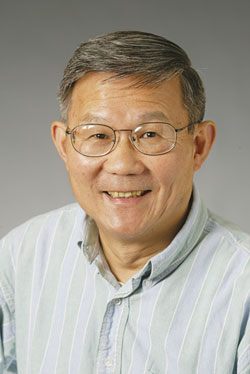Vital Signs
INVESTIGATOR INSIGHT
In this section, we highlight the human side of biomedical investigation, putting a few questions to a researcher at DMS-DHMC.

Ta Yuan Chang, Ph.D.
Professor and Chair of Biochemistry
T.Y. Chang joined the DMS faculty in 1976 and was named chair of the Department of Biochemistry in 2000. His primary research interest is the molecular regulation of cholesterol metabolism; in the mid- 1990s, his lab cloned the gene for an enzyme responsible for storing cholesterol.
How did you decide to become a scientist?
By default. I am not tall enough to be a good basketball player, nor am I talented enough to be a professional musician or singer!
If you weren't a scientist, what would you probably be?
I might be a mediocre professional singer in Taiwan, where I was raised and educated till I graduated from National Taiwan University with a bachelor's degree in chemistry.
Starting in high school, I had training in vocal music that continued for several years. In my junior year in college, I was a second-place winner in a vocal competition in Taiwan. I like singing, but I never made it as a professional singer. I have a bass-baritone voice, and I used to sing art songs by Schubert, Brahms, Handel, Scarlatti, et cetera. I can also sing songs by Rodgers and Hammerstein, as well as art songs and folk songs by Chinese composers. I still sing for audiences on occasion.
What famous scientist, living or dead, would you most like to meet?
There are many distinguished living ones that I would like to meet whom I have not met yet. For dead ones—Linus Pauling, Robert Woodward, and Hans Krebs.
Of what professional accomplishment are you most proud?
When I started our lab in the late 1970s, I was advised by many experienced scientists that what we wished to do—take a mammalian cell mutant approach to the study of cholesterol metabolism— was extremely risky and nearly impossible. But we succeeded in developing mammalian cell mutants that have allowed investigators to identify several genes, including ACAT [acyl coenzyme A: cholesterol acyltransferase], which play key roles in storing cholesterol and in the development of atherosclerosis.
My wife, Cathy, who is a much better experimental scientist than I am, accomplished the identification of the first ACAT gene in my laboratory.
What about you might surprise most people?
Despite repeated effort, I can never become a good experimental scientist in the lab.
What Web site do you use most often?
Pubcrawler [ http://pubcrawler.gen.tcd.ie/ ] is a very useful site for us to keep track of the latest research developments. It's a free alerting service that scans daily updates to the Medline and GenBank databases.
What are your favorite nonwork activities?
Listening to classical music and watching the wild birds in the backyard of our house.
What's the last movie you saw?
I saw one when I was riding on a Dartmouth Coach bus last week. It was not too interesting.
What advice would you offer to someone new in your field?
A young scientist should focus his or her efforts to accomplish something distinguished—something that can stand the trial of time. But there is no need to accomplish this task in a hurry.
If you could change one thing about your career, what would it be?
Nothing.
Finish this sentence: If I had more time I would . . .
Learn to play one or two musical instruments.
